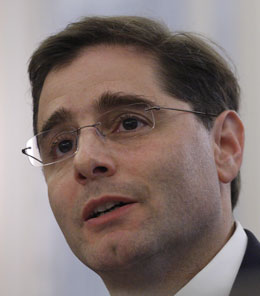The head of Federal Communications Commission(FCC) of U.S.’s thinks he has come up with a way to salvage his ambitious national broadband plans without running into legal obstacles that have threatened to derail him.
FCC chair Julius Genachowski has proposed a plan to govern internet access that he hopes will appease both service providers and consumer groups.
But his plan likely will hit legal challenges from the big phone and cable companies and already faces significant opposition from Republicans at the FCC and in Congress.
The FCC needs that legal authority for the sweeping national broadband plan that it released in March. Among other things, the plan aims to give more Americans access to affordable high-speed internet connections by revamping the federal program that subsidizes telephone service in poor and rural areas and using it to pay for broadband.
Internet companies such as Google and Skype say these rules are needed to prevent broadband providers from becoming online gatekeepers and blocking internet phone calls, streaming video and other services that compete with their core businesses.
The commission currently treats broadband as a lightly regulated “information service.” It had maintained that this framework gave it ample authority to proceed with its broadband plan and to impose net neutrality rules. But the U.S. Court of Appeals for the District of Columbia rejected this argument.
Genachowski now is seeking to redefine broadband as a telecommunications service subject to “common carrier” obligations to treat all traffic equally. Similar rules apply to other networks that serve the public, including roads, electrical grids and telephone lines.
The proposal is intended to strike a balance that can satisfy both internet service providers that oppose new regulations and public interest groups that are demanding greater consumer protections.
The commission will soon seek public comment on Genachowski’s proposal. It would have to be approved by at least three of the FCC’s five commissioners, and Genachowski is expected to have the support of his two fellow Democrats.
Several public interest groups and big internet companies, including Google, Skype, eBay and Amazon praised the proposal.
The two Republican FCC commissioners, Robert McDowell and Meredith Baker, said the proposal would “shatter the boundaries” of the agency’s authority and discourage broadband providers from investing in their networks. McDowell and Baker said Genachowski’s plan would impose “burdensome rules excavated from the early-Ma Bell-monopoly era onto 21st century networks.”
House Republican leader John Boehner of Ohio called the plan “a government takeover of the internet.”



